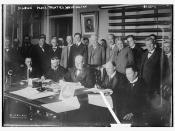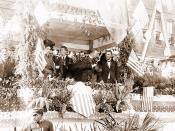Throughout the life of Booker T. Washington expressed in his autobiography, Up From Slavery, that one cannot succeed solely on a liberal education, but must accompany this with that of an industrial education as well. He believed that with this type of education, the black man could provide necessary services not only for himself, but also for those in his community as well.
According to Washington, "We wanted to teach the students how to bathe; how to care for their teeth and clothing. We wanted to teach them what to eat, and how to eat it properly, and how to care for their rooms. Aside from this, we wanted to give them such a practical knowledge of some one industry, together with the spirit of industry, thrift, and economy, that they would be sure of knowing how to make a living after they had left us. We wanted to teach them to study actual things instead of mere books alone."
This expresses his standards for education, but also the standards for what he felt every person should live by. Washington opened a school, Tuskegee Institute, where architecture, construction, and brick making were taught. In addition, students also learned such industries as landscaping, farming, and laundry.
Booker T. Washington's idea of education presents a huge dilemma because it accepts the alleged inferiority of blacks and represents the old attitude of adjustment and submission as the only means of survival of the race. This presents a paradox because being submissive in terms of political and civil rights does not allow blacks to better himself and propagate his heritage. Instead it completely undermines the identity of his soul and threatens to lose it for the sake of making blacks a contestant in the race.
DuBois was not an early opponent of...


